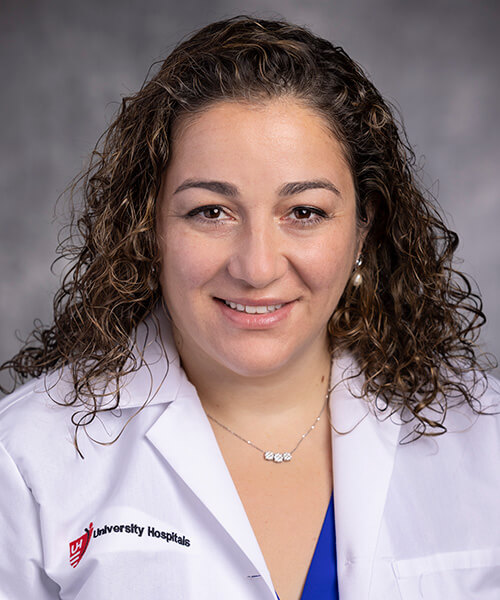Can Your Patient Benefit from Cancer Rehab?
June 24, 2024
UH Clinical Update | June 2024
An important part of cancer care is helping patients improve -- or even restore – physical function that the disease or treatment itself has diminished. At University Hospitals, cancer patients have a valuable resource for this work in cancer rehab specialist Yevgeniya Dvorkin Wininger, MD, and a dedicated team of physical, occupational and speech-language therapists.
 Yevgeniya Dvorkin Wininger, MD
Yevgeniya Dvorkin Wininger, MD“Our focus is on working with cancer patients during and after treatment to improve function,” Dr. Dvorkin Wininger says. “That is the goal. We address physical impairments, whether it's lymphedema, neuropathy, deconditioning or debility or other issues. Sometimes musculoskeletal issues come up during or after treatment, such as shoulder or back pain, and we work from a rehab perspective and the pain perspective to improve function.”
Dr. Dvorkin Wininger joined UH after spending six years at MetroHealth Medical Center and expanding their cancer rehab program. Prior to that, she completed residency training in Physical Medicine and Rehabilitation at University of Pittsburgh Medical Center and fellowship training in cancer rehabilitation at Memorial Sloan-Kettering Cancer Center. She currently sees cancer rehab patients at UH Seidman Cancer Center at UH Geauga, the Breast Center at UH Ahuja, UH Connor Whole Health in Beachwood and UH Portage Medical Center.
With cancer rehab, care, of course, is personalized to individual patient needs, goals and capabilities, Dr. Dvorkin-Wininger says.
“We work very closely with our therapists, depending on the severity of the impairment, understanding whether the patient is going to be OK doing some exercises on their own, whether they are quite deconditioned and need home therapy, or whether they need more extensive care,” she says. “We’ve also worked with Patient Education and therapists from Rehab Services to create educational exercise videos for patients who are home-bound, so they can do them at their own pace.”
Referrals, when necessary, to Physical Medicine and Rehabilitation colleagues for more extensive pain treatments are also a hallmark of care, as are collaborations with Rehab Services and Nutrition.
“I work very closely with other colleagues in nutrition, pain management, sports medicine and therapy,” Dr. Dvorkin-Wininger says. “It’s not a one-man show. They’re all really important for recovery.”
Dr. Dvorkin-Wininger says she’s interested in expanding cancer rehab services more widely to UH patients for “cancer pre-hab” – therapy that gets patients in the best shape possible before cancer surgery, radiation or chemotherapy even begin.
“It's like training for a marathon,” she says. “The more you're prepared from a physical, emotional, nutritional standpoint, hopefully the better the recovery will be.”
There’s also increasing evidence, Dr. Dvorkin-Wininger says, that exercise during and after cancer treatment leads to better clinical outcomes in certain cancers.
“There has been quite a lot of research to say that the benefits of exercise during treatment and after boosts survivorship for certain cancers and decreases risk of recurrence,” she says.
Building on this, she along with UH Seidman Cancer Center have collaborated with colleagues from The Gathering Place to create a Revive Exercise and Wellness program at UH Brunner Sanden Deitrick Wellness Center. This program provides 90 minutes to two hours of exercise, nutritional counseling and psychosocial support to cancer patients, twice a week, free of charge.
With all these efforts, Dr. Dvorkin-Wininger has a clear message: Although cancer inevitably diminishes physical function, improvement and recovery are possible.
“Every cancer patient who has lost some function that's affecting their quality of life can benefit from an evaluation and an understanding of those impairments,” she says.


